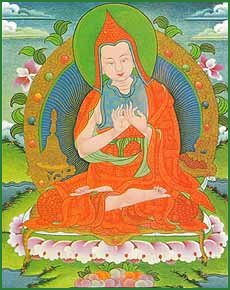The Great Chariot
by Longchenpa | 268,580 words
A Commentary on Great Perfection: The Nature of Mind, Easer of Weariness In Sanskrit the title is ‘Mahāsandhi-cittā-visranta-vṛtti-mahāratha-nāma’. In Tibetan ‘rDzogs pa chen po sems nyid ngal gso’i shing rta chen po shes bya ba ’...
Part 7 - The explanation of the twenty downfalls, together with the associated qualities
Train in keeping these two bodhicittas without harm.
Five downfalls, like wrong view, are said to be like a king.
Five, like staying in cities, are like his ministers.
Eight are like his subjects, and two are common to all.
Altogether, twenty is the number of these.
It should be known that what accords with these is harmful.
Not having them, we avoid the harm of all these downfalls.
It should be known that practicing this accords with goodness.
This follows the Essence of Space Sutra (nam mkha’ snying po’i mdo), where altogether nineteen root downfalls are taught. The five characterized as being like a king, are:
3. appropriating the property of the three jewels,
4. inflicting punishment on a monk who possesses discipline,
5. drawing a renunciate away from discipline,
6. committing one of the five inexpiable actions, and
7. holding to wrong views.
Those which are characterized as being like a minister are staying in
- villages,
- their vicinity,
- cities,
- towns and
- their environs.
The eight characterized as like ordinary people are
- teaching emptiness to those of untrained mind,
- turning back from dwelling in the Mahayana
- to join the Mahayana, abandoning individual enlightenment
- to fixate the shravaka and pratyekabuddha vehicles and enter into such fixation
- for the sake of possessions and veneration to praise oneself and disparage others;
- to speak of one’s own profound patience.
- to cultivate and take the property of the three jewels
- to give the up the wealth of shamatha for recitation
As for those that are common to all, abandoning the mind of entering makes nineteen, in addition to which The Jewel Heap Sutra says
abandoning the mind of entering, not uniting with goodness,
making twenty. The Moon Essence Sutra and the Essence of Space Sutra also say that abandoning the mind of entering is a downfall. If these downfalls arise, since this is unsuitable for a bodhisattva, try to remedy them.
In the Twenty Vows (sdom pa nyi shu) four root downfalls are taught:
- For the sake of possessions and veneration, praising oneself and disparaging others,
- To those who are suffering and without a protector not giving goods and Dharma, because of avarice;
- Not hearing others’ confessions and, instead, storing up anger,
- Abandoning the Mahayana and teaching a facsimile of Dharma.
The intention of calling them the four root downfalls is that they are like being conquered.
By desire of possessions and veneration
Giving praise to ourselves and disparaging others,
And to those who suffer without a protector
Stingily not giving wealth or Dharma;
Not hearing the confessions of other people,
But rather heaping up anger at those others;
Departing from the path of Mahayana
Teaching instead facsimiles of the Dharma.
According to the teacher Asanga and his followers, the four root downfalls are explained. Also the manner of receiving bodhicitta is said to be its arising from pure mind, depending only on homage and offerings, after first inquiring whether one’s being has been defiled with obstacles. By that these obstacles will have very little ripening. After that the precepts are said.
If any of the four root downfalls have arisen, the way of remedying them is that the twenty vows must be taken again, during which defilements must be confessed three times to the superiors before us. So it is said. This should not be accepted more than three times, according to what is explained in the Bodhisattvabhumis.
The followers of the master Nagarjuna say that the way of receiving is that the karma of these arises in a pure continuum, producing the seven-fold service. The ocean-like assembly does not ask about former obstructions and does not talk about later training. What is to be guarded against is the nineteen or twenty root downfalls.
The way of remedying according to the Essence of Space Sutra is that after supplicating, downfalls are remedied. This is done as many times as the downfalls received. Thus, the two traditions of mind-only and madhyamaka are different.
Now the associated factors are explained. As for the factors associated with these downfalls, for example, associated with wrong view is the obscuration of mere devotion. From this fault, one should have the idea of them all. The virtuous attitude and so forth that abandon wrong view are said to be without the fault. By not being obscured by the associated factor, we are also said to be without the fault. All that is associated with virtue is said to be what we should train in. In particular what is connected with benefiting others is the main thing to be trained in.
